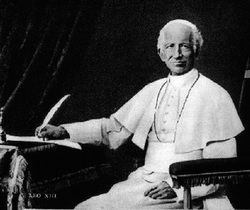 Pope Leo XIII begins Humanum Genus (the 1884 encyclical
Pope Leo XIII begins Humanum Genus (the 1884 encyclical
on Freemasonry) by acknowledging the divided heart of humanity since the Fall
man and woman: there are “separated into two diverse and opposite parts, of
which the one steadfastly contends for truth and virtue, the other of those
things which are contrary to virtue and to truth. The one is the kingdom of God
on earth, namely, the true Church of Jesus Christ; and those who desire from
their heart to be united with it, so as to gain salvation, must of necessity
serve God and His only-begotten Son with their whole mind and with an entire
will. The other is the kingdom of Satan, in whose possession and control are
all whosoever follow the fatal example of their leader and of our first
parents, those who refuse to obey the divine and eternal law, and who have many
aims of their own in contempt of God, and many aims also against God.”
recommendations was to advocate the faithful’s vital membership in the Third
Order of St Francis, today called the Secular Franciscan Order. Himself a Third
Order Franciscan, Pope Leo’s recommendation didn’t fall on deaf ears because
diocesan seminarians, priests and bishops joined the Third Order and millions
of the laity followed suit. Here is what Pope Leo XIII said:
without cause do We use this occasion to state again what We have stated
elsewhere, namely, that the Third Order of St. Francis, whose discipline We a
little while ago prudently mitigated,* should be studiously promoted and
sustained; for the whole object of this Order, as constituted by its founder,
is to invite men to an imitation of Jesus Christ, to a love of the Church, and
to the observance of all Christian virtues; and therefore it ought to be of
great influence in suppressing the contagion of wicked societies. Let,
therefore, this holy sodality be strengthened by a daily increase. Amongst the
many benefits to be expected from it will be the great benefit of drawing the
minds of men to liberty, fraternity, and equality of right; not such as the
Freemasons absurdly imagine, but such as Jesus Christ obtained for the human
race and St. Francis aspired to: the liberty, We mean, of sons of God, through
which we may be free from slavery to Satan or to our passions, both of them
most wicked masters; the fraternity whose origin is in God, the common Creator
and Father of all; the equality which, founded on justice and charity, does not
take away all distinctions among men, but, out of the varieties of life, of duties,
and of pursuits, forms that union and that harmony which naturally tend to the benefit
and dignity of society. (34)
Concessum (Sept. 17, 1882), in which Pope Leo XIII had recently glorified St.
Francis of Assisi on the occasion of the seventh centenary of his birch. In
this encyclical, the Pope had presented the Third Order of St. Francis as a
Christian answer to the social problems of the times. The constitution Misericors
Dei Filius (June 23, 1883) expressly recalled that the neglect in which
Christian virtues are held is the main cause of the evils that threaten
societies. In confirming the rule of the Third Order and adapting it to the
needs of modern times, Pope Leo XIII had intended to bring back the largest
possible number of souls to the practice of these virtues.
to be a new appraisal of the vocation to the Secular Franciscans with the encouragement to join!
